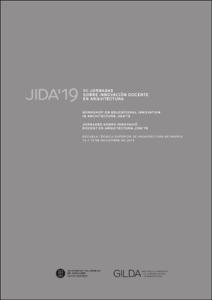Mostra el registre d'ítem simple
Proyectar deprisa, proyectar despacio. Talleres de aprendizaje transversal.
| dc.contributor.author | Cabrero Olmos, Raquel |
| dc.date.accessioned | 2019-11-05T07:28:41Z |
| dc.date.available | 2019-11-05T07:28:41Z |
| dc.date.issued | 2019-11 |
| dc.identifier.citation | Cabrero Olmos, Raquel. Proyectar deprisa, proyectar despacio: talleres de aprendizaje transversal. A: García Escudero, D.; Bardí Milà, B, eds. "VII Jornadas sobre Innovación Docente en Arquitectura (JIDA'19), Escuela Técnica Superior de Arquitectura de Madrid, 14 y 15 de Noviembre de 2019 ". Barcelona: UPC IDP; GILDA, 2019. ISBN: 978-84-9880-797-4, p. 215-227 |
| dc.identifier.isbn | 978-84-9880-797-4 |
| dc.identifier.issn | 2462-571X |
| dc.identifier.uri | http://hdl.handle.net/2117/171525 |
| dc.description.abstract | El cambio generacional observado en los alumnos que habitan las aulas actualmente hace necesaria una adaptación del modo tradicional de enseñar y aprender arquitectura. La presente comunicación quiere compartir una experiencia docente llevada a cabo en la asignatura Proyectos, cuya propuesta innovadora emerge de la combinación de distintos ritmos de trabajo e ideación para lograr el aprendizaje de la metodología proyectual. Por un lado, se mantiene el ritmo de trabajo tipo taller de proyectos a lo largo del semestre, a lo que denominamos "arquitectura lenta". Por otro lado, se incorporan una serie de talleres transversales de desarrollo puntual y guiados por una metodología ágil, a lo que denominamos "arquitectura rápida". La incorporación de un ritmo más ágil se adapta a las necesidades de los alumnos de una nueva generación, permitiendo tener una visión global del ciclo proyectual, recibir feedback más inmediato sobre las propuestas diseñadas y trabajar en formato colaborativo. |
| dc.description.abstract | The generational change observed in the students who are in the classrooms nowadays makes it necessary to adapt the traditional way of teaching and learning Architecture. This paper wants to share a teaching experience carried out in the Projects subject, whose innovative proposal emerges from the combination of different work and ideation rhythms to achieve the learning of design thinking methodology. On the one hand, the pace of the subject is maintained throughout the semester, which we call "slow architecture". On the other hand, a series of exceptional transversal workshops guided by an agile methodology are incorporated, which we call "fast architecture". The incorporation of a more agile rhythm adapts to the needs of the students of a new generation. It allows to have a global vision of the project cycle, to receive more immediate feedback on the proposals designed and to work in a collaborative way. |
| dc.format.extent | 13 p. |
| dc.language.iso | spa |
| dc.publisher | Universitat Politècnica de Catalunya. Iniciativa Digital Politècnica |
| dc.publisher | Grup per a la Innovació i la Logística Docent en l'Arquitectura (GILDA) |
| dc.relation.ispartof | Jornadas sobre Innovación Docente en Arquitectura (7as: 2019: Madrid) |
| dc.relation.uri | http://hdl.handle.net/2117/175389 |
| dc.rights | Attribution-NonCommercial-NoDerivatives 4.0 International |
| dc.rights.uri | https://creativecommons.org/licenses/by-nc-nd/4.0/ |
| dc.subject | Àrees temàtiques de la UPC::Ensenyament i aprenentatge |
| dc.subject | Àrees temàtiques de la UPC::Arquitectura |
| dc.subject.lcsh | Architecture -- Study and teaching (Higher) |
| dc.subject.lcsh | Creative thinking |
| dc.subject.other | Architectural projects |
| dc.subject.other | Active methodologies |
| dc.subject.other | Design thinking |
| dc.subject.other | Critical discipline |
| dc.subject.other | Motivation |
| dc.subject.other | Proyectos arquitectónicos |
| dc.subject.other | Metodologías activas |
| dc.subject.other | Design thinking |
| dc.subject.other | Disciplina crítica |
| dc.subject.other | Motivación |
| dc.title | Proyectar deprisa, proyectar despacio. Talleres de aprendizaje transversal. |
| dc.title.alternative | Fast architecture, show architecture. Learning through cross curricular workshops |
| dc.type | Conference report |
| dc.subject.lemac | Arquitectura -- Ensenyament universitari |
| dc.subject.lemac | Pensament creatiu |
| dc.identifier.doi | 10.5821/jida.2019.8311 |
| dc.identifier.dl | B 9090-2014 |
| dc.description.peerreviewed | Peer Reviewed |
| dc.rights.access | Open Access |
| dc.date.updated | 2019-11-05T07:28:41Z |
| dc.relation.references | ACASO, M. (2013). rEDUvolución. Hacer la revolución en la educación. Barcelona: Paidós. |
| dc.relation.references | ARGYRIS, C. y SCHÖN, D. (1978). Organizational learning: A theory of action perspective . Reading, Ma.: Addison-Wesley. |
| dc.relation.references | BROWN, T. (2008). “Design Thinking” en Harvard Business Review, 86(6) 84-92. |
| dc.relation.references | CSIKSZENTMIHALYI, M. (1997). Flow. Una psicología de la felicidad. Barcelona: Kairós. |
| dc.relation.references | d.School at Stanford University (2008). An introducción to Design Thinking Process Guide. Disponible en: <https://dschool-old.stanford.edu/sandbox/groups/designresources/wiki/36873/attachments/74b3d/ModeGuideBOOTCAMP2010L.pdf> [Consulta: septiembre 2019] |
| dc.relation.references | OECD (2012). The Nature of Learning. Guía del practicante. Paris: OECD Publishing. Disponible en: <http://www.oecd.org/education/ceri/The%20Nature%20of%20Learning.Practitioner%20Guide.ESP.pdf> [Consulta: agosto 2019] |
| dc.relation.references | OECD (2017). The OECD Handbook for Innovative Learning Environments.Paris: OECD Publishing. Disponible en: <https://doi.org/10.1787/9789264277274-en> [Consulta: agosto 2019] |
| dc.relation.references | VILANOVA, N. y ORTEGA, I. (2017).Generación Z. Todo lo que necesitas saber sobre los jóvenes que han dejado viejos a los millennials. Barcelona: Plataforma Editorial. |
| dc.relation.references | World Economic Forum (2018). The Future of Jobs. Disponible en: <http://www3.weforum.org/docs/WEF_Future_of_Jobs_2018.pdf> [Consulta: septiembre2019] |
| local.citation.contributor | Jornadas sobre Innovación Docente en Arquitectura (JIDA) |
| local.citation.pubplace | Barcelona |
| local.citation.publicationName | VII Jornadas sobre Innovación Docente en Arquitectura (JIDA'19), Escuela Técnica Superior de Arquitectura de Madrid, 14 y 15 de Noviembre de 2019: libro de actas |
| local.citation.startingPage | 215 |
| local.citation.endingPage | 227 |
| local.ordre | 19 |
| local.personalitzacitacio | true |


